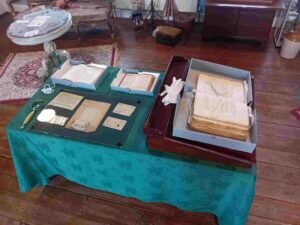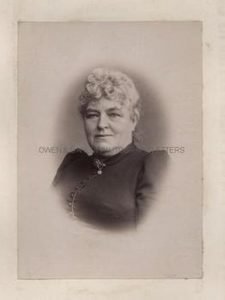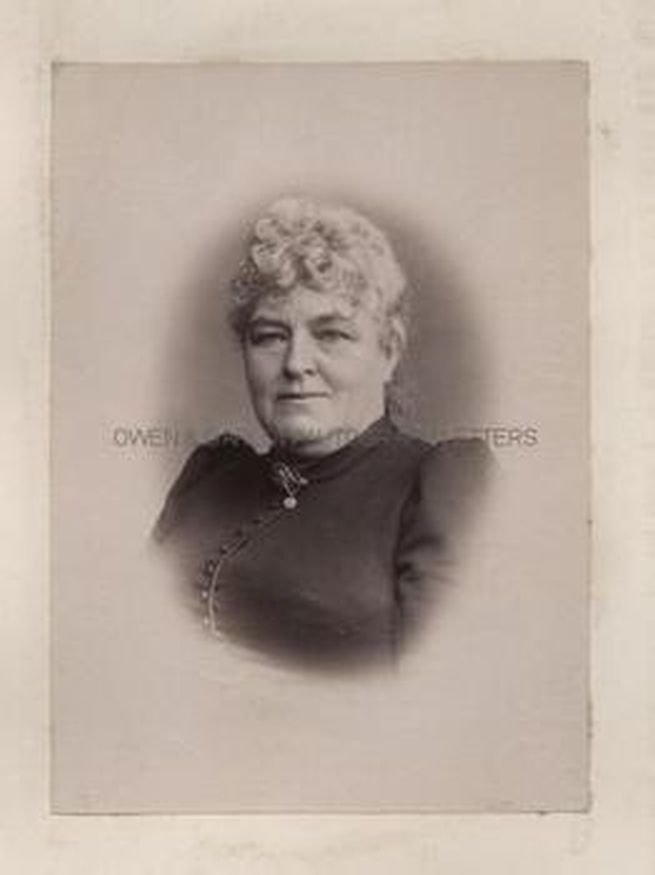



Emily Crawford – journalist – whose father came from Edgeworthstown.
Crawford, Emily was born 31 May 1841, probably in Dublin, daughter of Andrew Johnstone, landowner, of Corboy, Edgeworthstown, Co. Longford, and Grace Johnstone, an American. After the death or her husband in 1857 Grace took Emily and her sister to Paris and there Emily attended the Sorbonne. Emily’s career as a journalist and Paris correspondent began after a friend in Britain, reading her letters from Paris, suggested she should send a ‘Letter from Paris’ to an American newspaper, Crawford also sent one to London’s Morning Star and by 1864 she was making £400 a year from her journalism,
Johnstone married George Morland Crawford, assistant Paris correspondent for the Daily News’ in 1864 and they became a journalistic team until his death in 1885, Emily Crawford then formally inherited her husband’s position on the Daily News and wrote for the weekly’ Truth”, started in 1877 by Henry Labouchère’, the owner of the Daily News. The Weekly Dispatch”, the Calcutta Englishman and the Chicago Daily News all employed Crawford as their Paris correspondent while she also wrote for the New York Tribune, the New York Century Macmillan”, the Fortnightly Review’, the Contemporary Review”, the Ladys World and the quarterly Subjects of the Day. Crawford largely covered politics’ and cultural events. Her impressive network of political and artistic connections informed her own habit of personal study and reflection on daily events which accorded her a reputation for analytical depth in her writing.
She was offered the Légion d’honneur, which she declined, but was made a life fellow of the Institute of Journalists in 1890 by her colleagues in Britain and president of the Society of Women Journalists’ in 1901. CIL Source: ODNB.
Below is a profile of Emily that appeared in The Mercury (an Australian newspaper)(Hobart, Tas. : 1860 – 1954), Thursday 28 August 1890, page 2
A QUEEN AMONG JOURNALISTS
Under this very appropriate heading ” Flora,” in the London Echo, pays a well-deserved tribute to the remarkable capacities of the Paris correspondent of the Daily News :-” It was on one of the dullest days last winter, when the influenza plague was at its height in Paris,” says the writer, “that I mounted to the charming flat ‘ Au Cinquième,’ in Boulevard de Courcelles to visit Mrs. Emily Crawford, who has been justly described as ‘one of the most interesting personalities of journalism.’ Herself suffering from influenza I found her, nonetheless, hard at work having just returned from her rounds of the Parisian hospitals, where she gleaned daily information for the Daily News, of which she has been for so long tho honoured correspondent. Mrs. Crawford knows not how to spell the word fear; she is strong and courageous both in heart and head. In the awful cholera year she was a constant visitor at the hospitals ; when Paris was in the hands of the infuriated Communists she made her way at nightfall through the barricaded city on March 23, 1871, and interviewed the Communist leaders as they sat in council. Many a time when shots were falling around she set forth on some journalistic enterprise, carrying no arms, her ready wit and quick perception proving her surest weapons of defence. In the previous year, she and her husband, having entrusted their young children to the care of friends in England, determined, to remain as special correspondents through the siege. This heroic resolve was, however, frustrated, and they reluctantly left the soon-to-be beleaguered city, and made their way to the ambulances of Tours, Orleans, and Bordeaux.
“Much of the most graphic war correspondence at this time came from Mrs. Crawford’s pen, who always worked in conjunction with her husband. When the order came to leave Paris, their cellars were already well provisioned for the siege, and they had but half an hour to pack before the last train left tho city. Immediately they had crossed the Seine a terrific oxplosion was heard, and, looking out of the window, Mrs. Crawford saw the railway bridge blown into mid-air. They were detained, many days on the line, and, soon after starting, another train ran into the midst of theirs, killing l8 persons. Only a few hours before Mr. and Mrs. Crawford had removed from the doomed carriage to the back part of the train, and so escaped destruction. Arrived at Bordeaux, by paying an extravagant price, they were allowed to share the floor of a little inn kitchen, together with some score of fugitives. The bare boards were their only bed for many months, but in the midst of these privations the gallant couple found magnificient opportunities for observation of the stirring events of those times, which were rccorded by them in many English and American newspapers.
Trained in such a school Mrs. Crawford is one of the most singleminded, large hearted, and able-headed members of the journalistic profession. She is absolutely indifferent to the petty, material side of life, which blinds so many to its great principles. Singularly devoid of vanity, widely acquainted with men and things, generous in judgment, she is kindness personified to the less fortunate. Endowed with a grand constitution, she faces her work with a soldierly spirit, fired with the conviction that there is nothing that a man can do that a woman cannot do also. She has a fascinating and womanly personality. Her eyes are of a clear Irish blue, her complexion at 50 is as clear as a child’s, her smile is like sunshine, and the grey of her thick, curly hair only adds to her charms. Her spirits are almost boyish in their exuberance. One of her feats last year was the ascent of the still incomplete Eiffel Tower. She climbed to the top of tho dizzy spiral staircase, which visitors to the Exhibition will remember was barred to the public from the second floor upwards. Through her friendship with M. Thiers she not infrequently obtained access to his private cabinet, and telegraphed from thence news to England, at a time when not a single English journal was connected with Paris by a private wire. In fact, she may be said to have inaugurated the private wire system in Paris.
Her most remarkable feat was on the occasion of the historic debate of May 25, 1871, at Versailles. All that day, from 7 in the morning until mid-night, she sat in the front row of the loge grillée to which she had been admitted by special favour. Unable to move or take a single note she carried away the leading points in her memory, returned to Pans, sat up all night writing, and caught the early mail, by which means hers was the first full account of the debate and defeat of the French Government which reached the English Press. Meantime, Mr. Crawford, unable to obtain admittance, mingled with the crowd which surged to and fro in the precincts of the Palace and thus gathered the state of popular feeling which lent such colour to the graphic recital of the event. As a chronicler of the higher side of life she is no less faithful. When the streets were deserted by the cabmen, and in the midst of a thunder storm which daunted the most intrepid, she once left a grand State ball and rushed in satin shoes and ball dress through the streets to the telegraph office, and there, soaked to the skin, despatched a description to London.
“It goes without saying that the demands made upon a journalist of Mrs. Crawford’s calibre are manifold. Time will not permit her to undertake half of the work offered to her. She has long been a weekly contributor to the New York Tribune; and Mr. Whitelaw Reid, its proprietor, now American Minister in Paris, after looking through his ledger one day, wrote to her at his own initiative candidly admitting that she was not receiving half the value of her work, and raised the scale of remuneration. She has not infrequently been asked to correspond for leading Conservative organs on her own terms but so true is she to Radical and Republican principles that not even the most advantageous offers have ever tempted her. ‘How could I’ she remarked, ‘ as the daughter of my mother, who in Tory circles, and at a time prior to the epoch-making work of Carlyle, would bravely stand forth to champion Oliver Cromwell.’ This dearly-loved mother she describes as ‘a person of great inspiration,’ gentle, yet firm, who taught her little Emily the Psalms, straightened her back by weaving for her a collar of holly leaves, and allowed her to muse undisturbed in the family library on their remote Irish estate. Mrs. Craw-ford’s father, Mr. Johnstone, was of Scotch descent; her mother belonged to an old Irish family. The death of her father, and the removal of the family to Paris in straitened circumstances, fired the young girl with an enthusiasm for work. An act of selfdenying kindness to an invalid lodging in the same house gave her at l8 her first journalistic introduction. Herself bored with the dry-as-dust newspaper style which then prevailed, she at once when Paris was at its gayest Empire days, jotted down her impressions of life generally in the Champs Elysées, the Boulevards, and the Bois de Boulogne. For a long time she corresponded for Once a Week. Now the Daily News, Truth, and the New York Tribune engage most of her time. Her ready pen, however, takes occasional excursions into the reviews. Of her children,
two are already making careers for themselves – one as a mathematical coach at Clifton, the other has just made a successful entrance into the field of journalism as special correspondent at Lisbon during the Dom Pedro crisis.”
The best way to keep in touch and to be aware of our events
Don’t forget to confirm your subscription in the Email we just sent you!
Please pre-book your visit over Christmas and New Year at least 24h in advance via Email or Online booking.
MondayClosed
Tuesday10:00 AM - 5:00 PM
Wednesday10:00 AM - 5:00 PM
Thursday10:00 AM - 5:00 PM
Friday10:00 AM - 5:00 PM
Saturday11:00 AM - 5:00 PM
Sunday11:00 AM - 5:00 PM
Adult €7.50
Children 10 to 16 €3
2 Adults & 2 Children €15
Adult is 16 years+
Family Ticket is 4 family members together
Children under ten are free but must be accompanied by an Adult

This project was assisted by Longford Local Community Development Committee, Longford Community Resources Clg. and Longford County Council through the LEADER Programme 2023 -2027 which is part-financed by the EU, “The European Agricultural Fund for Rural Development: Europe investing in rural areas” and the Department of Rural & Community Development
The Maria Edgeworth Centre is operated under the direction of the Edgeworthstown District Development Association (EDDA) – a Not for Profit Voluntary Community based registered charity Reg:223373. Registered Charity Number 20101916
© 2023 Maria Edgeworth Centre – All Rights Reserved